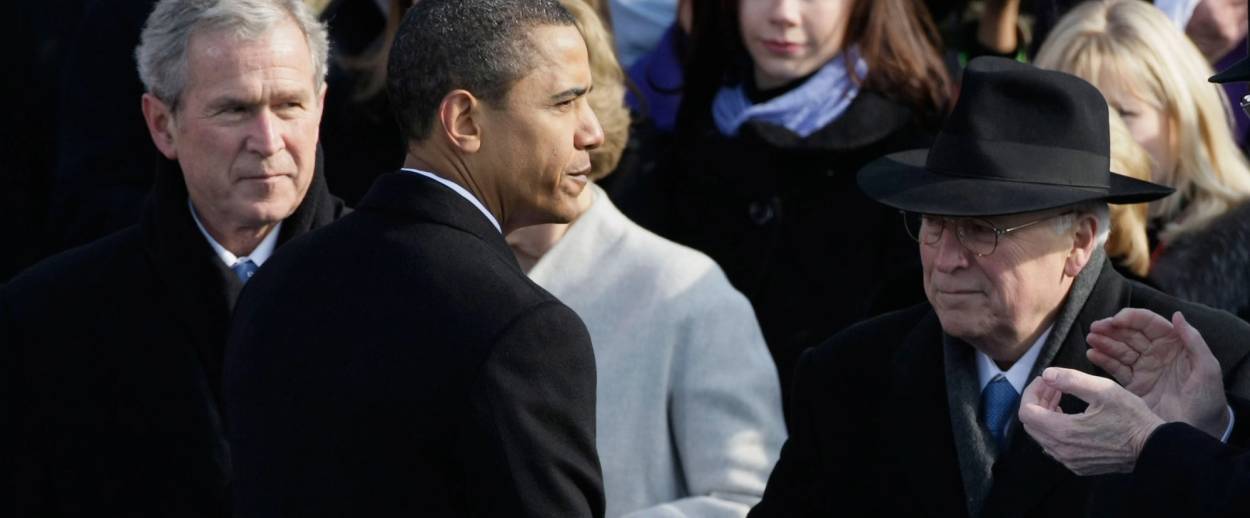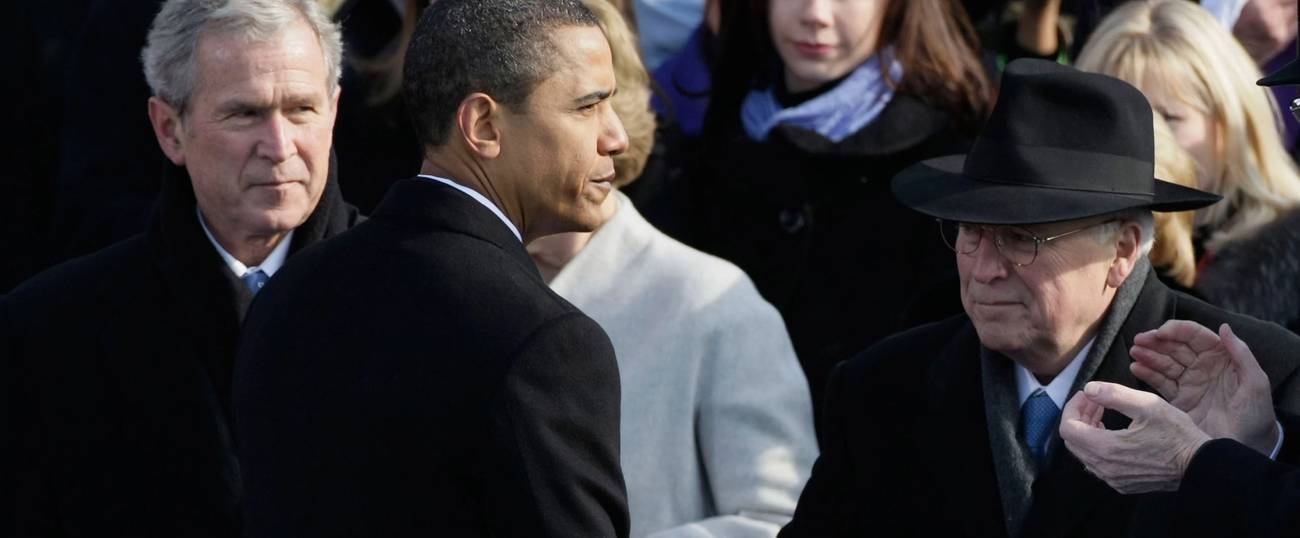Ending the Mindset Is Hard
President Barack Obama has done more to pivot the United States away from the hawkish foreign policy entrenched in Washington than even his supporters give him credit for




Reading “The Obama Doctrine,” the Atlantic’s long piece on President Barack Obama’s foreign policy, as told to journalist Jeffrey Goldberg in a series of interviews, I kept flashing back to that moment in the January 2008 primary debate. You know the one. Responding to a question about the Iraq war, then-Sen. Barack Obama delivered his most succinct description of the approach he would eventually take on foreign policy: “I don’t want to just end the war,” he said, “but I want to end the mindset that got us into war in the first place.”
This line electrified progressive foreign policy analysts and journalists, especially younger ones like myself whose entrance into the discussion was shaped to a great degree by the Iraq tumult. It wasn’t just that the Iraq war was a blunder, Obama was saying, nor was it just the folly of a single administration. No, the Iraq war was a product of Washington’s entire way of thinking about American power.
The Atlantic piece is Obama’s account of his effort to confront that way of thinking and how and why it continues to resist change. Little in the piece is new—but Goldberg achieves something quite useful by gathering all of this material together for us in one place and writing down some of the president’s more recent formulations of the policies and approaches that he has been communicating throughout his presidency. There was the June 2009 Cairo speech, where he attempted to repair America’s image in the eyes of the Muslim world—an admittedly problematic term—and signaled American support for Islamist political participation. There was the December 2009 Nobel Peace Prize speech, in which he both defended the use of force (“To say that force may sometimes be necessary is not a call to cynicism—it is a recognition of history; the imperfections of man and the limits of reason”) while also taking a shot at his hawkish critics who see it as the tool of first resort. (“I know that engagement with repressive regimes lacks the satisfying purity of indignation.”)
Interestingly, the initiative that most effectively demonstrates Obama’s foreign policy approach, the outreach to Iran and the eventual P5+1-Iran nuclear agreement, receives relatively little attention. It’s hard to know why a more fulsome defense of the policy didn’t make it into the piece—Goldberg having been a key instrument for Obama’s communications team during the debate over the Iran deal with both the American Jewish community and the Israeli government—but it’s worth reviewing: Obama instigated and won a major debate on the direction of U.S.-Iran relations during the 2008 election, arguing that constructive engagement and outreach to Iran coupled with strong multilateral sanctions pressure could produce an agreement that prevented an Iranian nuclear weapon, and, through the strong and slow drilling of a hard board, that’s what happened.
Some have described Obama’s stated aversion to enlisting the United States in the region’s sectarian squabbles and his goal of a “cold peace” between Iran and Saudi Arabia as evidence of a long suspected “realignment” with Iran against traditional Arab allies and Israel. But Obama laid out his vision of Iran’s future regional role in a January 2014 New Yorker article. “It would be profoundly in the interest of citizens throughout the region if Sunnis and Shias weren’t intent on killing each other,” Obama told David Remnick, in an excellent interview. “And although it would not solve the entire problem, if we were able to get Iran to operate in a responsible fashion—not funding terrorist organizations, not trying to stir up sectarian discontent in other countries, and not developing a nuclear weapon—you could see an equilibrium developing between Sunni, or predominantly Sunni, Gulf states and Iran in which there’s competition, perhaps suspicion, but not an active or proxy warfare.” The fact that anyone might find this controversial is exhibit A of the mindset Obama has tried to end.
The piece reveals that Obama gets Washington better than even many of his strongest supporters imagined. He deeply understands how D.C. groupthink can corrode creativity and how even pragmatists can be broken down and swept up by the inspirational belief that American power is magic. That Obama, who has engaged the U.S. militarily in multiple countries (How many? Don’t you know? Exactly.) might be considered “anti-interventionist” shows only how wildly tilted the debate has become. Obama is “anti-interventionist” in the same sense that the recent Iranian elections were won by “moderates”—true only in the sense of the limited options available.
Obama gets Washington better than even many of his strongest supporters imagined. He deeply understands how D.C. groupthink can corrode creativity and how even pragmatists can be broken down and swept up by the inspirational belief that American power is magic.
That’s most certainly not to say there haven’t been serious mistakes. Even though the U.S. military withdrawal from Iraq was clearly the right move, both one he was elected to achieve and part of his broader objective to right-size the U.S.’s over-commitment to the Middle East, Obama’s political disengagement from Iraq, as Prime Minister Nouri al Maliki remade himself into a mini Saddam, is confounding and tragic. The oft-heard (usually by the Iraq war’s remaining supporters, who are almost entirely concentrated in Washington) claim that Obama “squandered” the success of the 2007 Iraq troop surge is nonsense. But by taking a hands-off approach, it seems that he did squander the opportunity to use some hard-won knowledge of Iraq to try and ameliorate some of the political divisions that the surge strategy entrenched. The political pullout from Iraq, rather than the military one, in my view, demonstrated the validity of the charge that Obama was over-correcting from the Bush years.
Obama is clear that while we can’t lead everywhere, it’s still the United States that, to a great degree, sets the international agenda. But after seven years in office he seems less clear that human rights and political reform must be part of the agenda. Amid the Arab Spring’s backlash, the United States has reverted to its dependency on unaccountable authoritarian regimes to deliver security, without bothering too much with how that security is delivered. The Syrian civil war shadows much of Goldberg’s piece, without the president or his interlocutor seeming to press very hard on the questions of what America might have done or is doing now. Even though I think Obama has been correct to steer clear of the morass, I’m haunted by the possibility that an earlier intervention in Syria could have averted the current catastrophe. As the son of refugees, raised with some understanding of the disruption, the discontinuity, the aching loss that attends the refugee experience even for those lucky ones who make it to the promised land, I’m bitterly unsatisfied with the idea that the most powerful country in the world couldn’t have changed the outcome. But if Obama is similarly haunted, he doesn’t show it.
As he heads toward the end of his presidency, Obama has not ended the mindset that got us into Iraq, but he’s made progress in changing it. He’s put some points on the board. The question, which only time will tell, is whether that change will endure.
***
Like this article? Sign up for our Daily Digest to get Tablet Magazine’s new content in your inbox each morning.
Matthew Duss is president of the Foundation for Middle East Peace, based in Washington, DC.